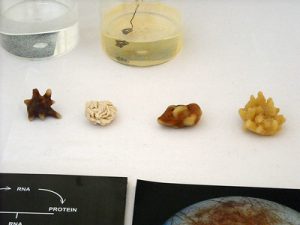Many people suffer from a medical condition commonly known as kidney stones. There are actually several types of kidney stones. Calcium oxalate crystals are the most prevalent kind of kidney stone. Let’s look at what calcium oxalate is and why it can cause problems. We’ll also explore some of the best calcium oxalate stone prevention and treatment options.

The Different Kidney Stone Types:
There are several kidney stone types. The symptoms and best remedies and treatments may differ from one type to another.
- Calcium oxalate stones – The most common type of kidney stone which is created when calcium combines with oxalate in the urine. Inadequate calcium and fluid intake, as well other conditions, may contribute to their formation.
- Uric acid stones — Foods such as organ meats and shellfish have high concentrations of a natural chemical compound known as purines. High purine intake leads to a higher production of monosodium urate, which, under the right conditions, may form stones in the kidneys. The formation of these types of stones tends to run in families.
- Struvite stones — These are stones that form due to an infection in the urinary tract. Kidney stones and infection are a dangerous combination and require prompt medical attention.
- Cystine stones — These are relatively uncommon types of kidney stones, caused by a genetic disorder.
All types of kidney stones are potentially serious and it’s important to get an accurate diagnosis if you think you might have this condition.
Calcium Oxalate Stones Options
If you’ve been diagnosed with calcium oxalate stones, there are several possible treatments. Depending on the size of the stones and whether they pass through your body on their own, you may need a medical procedure or you may be able for kidney stones treatment at home.
- Ureteroscopy —Stones are removed or broken down using a tube-like medical instrument. Your doctor will pass the scope through your bladder and ureter into your kidney. They use a small basket to remove small stones. If the stones are larger, the doctor will pass a laser through the scope to break them up. You usually are able to go home on the same day.
- Shock Wave Lithotripsy — Stones are broken down using shock waves so they can pass through your urinary tract. Both lithotripsy and ureteroscopy are surgical procedures requiring general anesthesia, but they can be completed in about one hour without having to stay overnight in a hospital.
- Percutaneous nephrolithotomy — This type of surgery, in which a tube is inserted into the kidneys, is only used for larger stones and requires a hospital stay.
- Treating kidney stones at home — If the stones are small enough, your doctor may advise you to drink plenty of fluids and make adjustments to your diet.
The following are some dietary guidelines to keep in mind for treating and preventing kidney stones.
Calcium Oxalate Stones Diet
Many common foods contain oxalates, which can contribute to the formation of calcium oxalate stones or cause them to grow faster. It’s important to learn which foods are high in oxalates so you can remove them from your diet. The following is a partial list.
- Ice Tea
- Sweet potatoes
- Spinach and many other dark, leafy vegetables.
- Soy products such as tofu and soy milk.
- Berries
- Oranges
- Wheat bran
- Rhubarb
- Beans — Navy beans, northern beans and adzuki beans are high in oxalate. Others, such as garbanzo beans (chickpeas), black-eyed peas and lima beans are low oxalate.
- Nuts — Cashews, almonds, Brazil nuts and pine nuts are all high in oxalates. Others, such as chestnuts and pistachios are lower.
Avoiding high oxalate foods can be challenging at first, as the list contains many foods normally considered healthy. In addition, certain categories of foods such as fruits, vegetables and legumes include both low and high oxalate items. When you have kidney stones, you need to get familiar with the oxalate content of all the foods you typically consume.
Tips For Preventing Calcium Oxalate Stones
Whether you currently have calcium oxalate stones or simply want to reduce your risk, here are some guidelines to help you keep your kidneys healthy.
- Drink plenty of water.
- Get regular moderate exercise.
- Learn which foods are high in oxalate and limit sodium and animal proteins.
- Consider supplements for the kidneys. A known few ingredients that may support kidney health as relates to stopping kidney stones include citric acid, phytin, pyridoxine, magnesium citrate, banana stems, and they say some probiotics and chanca piedra may even help as well. However not all ingredients are safe to consume on-going to stop recurrence. For example, medical experts say one should not take Chanca Piedra for more than 3 months.
- Get prompt medical attention for any serious symptoms such as blood in the urine or severe pain.
